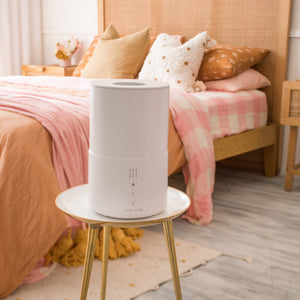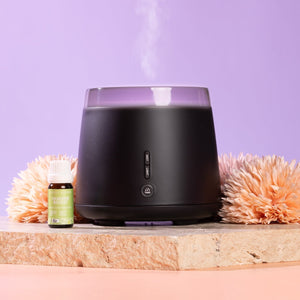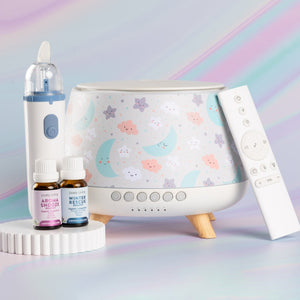Essential Oils and Perfect Sleep Tips for Restful Nights
Looking for perfect sleep tips? You're not alone. In our fast-paced world, getting quality shut-eye can feel like chasing a dream. Achieving a good night's rest is fundamental for maintaining good health, both physically and for your mental health.
This guide will explore practical and effective strategies to help you improve sleep. From simple lifestyle tweaks to understanding your body's natural rhythms, we'll help you transform your nights. You can wake up feeling refreshed and ready to take on the day.
Table of Contents:
- Create the Perfect Sleep Environment
- Perfect Your Sleep Schedule
- Watch What You Eat and Drink
- Get Moving During the Day
- Manage Stress and Anxiety
- Know When to Seek Help
- Conclusion
Create the Perfect Sleep Environment
Your bedroom plays a huge role in sleep quality. The environment you sleep in can either promote sleep or disrupt it entirely. Let's start with some easy changes to turn your space into a sleep sanctuary.
Keep It Cool
Your body temperature naturally drops as you prepare to fall asleep, a key part of your circadian rhythm. You can help this process by keeping your room cool. Aim for a temperature between 60-67°F (15-19°C) for optimal rest.
If you often feel too warm, consider using breathable cotton sheets, a ceiling fan, or a cooling mattress topper. A cooler room signals to your body that it is time to sleep. This simple adjustment can significantly improve how quickly you fall asleep.
Embrace the Dark Side
Light is a powerful signal to your brain that it's time to be awake, making it the enemy of good sleep. Invest in quality blackout curtains or a comfortable sleep mask to block out street lights and early morning sun. This helps your brain produce melatonin, the hormone that makes you feel sleepy.
Even small amounts of light from electronics or clocks can disrupt your sleep cycle. Cover or remove any devices with bright lights. Minimizing all light exposure in your bedroom is crucial for deep, uninterrupted rest.
Silence is Golden
Noise can be a major sleep disruptor, preventing you from falling asleep or waking you up during the night. If you live in a noisy apartment or on a busy street, a white noise machine can be a lifesaver. It creates a consistent, soothing sound that masks jarring noises.
Alternatively, you could try earplugs if you are sensitive to any sound at all. Some people also find listening to soothing music or nature sounds helps them relax and drift off. Find what works for you to create a peaceful audio environment.
Perfect Your Sleep Schedule
Consistency is fundamental when it comes to healthy sleep. Your body has an internal clock, and it thrives on routine. Establishing a regular sleep schedule is one of the most effective sleep habits you can adopt.
Stick to a Schedule
Try to go to bed and establish a consistent wake-up time every single day. This should be followed even on weekends and holidays when the temptation to sleep in is strongest. This practice reinforces your body's sleep-wake cycle, making it easier to fall asleep and wake up naturally.
Sticking to a sleep schedule might feel difficult at first, especially if your habits are irregular. However, after a few weeks, your body will adjust. This consistency is a pillar of good sleep hygiene.
Create a Bedtime Ritual
Develop a relaxing pre-bed routine that signals to your body it's time to wind down. This ritual could include taking a warm bath, which can help lower your body temperature afterward and promote sleep. You might also try reading a physical book, practicing gentle stretches, or performing your nightly skin care routine.
Your body will start to associate these activities with sleep, making it easier to fall asleep. Avoid stimulating activities like watching intense TV shows or discussing stressful topics right before bed. The goal is to calm your mind and body.
Watch What You Eat and Drink
What you put into your body, especially in the hours before bed, can have a big impact on your sleep. Certain foods and drinks can disrupt sleep, while others can help. Making mindful choices is part of a healthy lifestyle that supports rest.
Say No to Late-Night Snacks
Eating large meals close to bedtime can lead to indigestion, heartburn, and discomfort, making it hard to fall asleep. Try to finish your dinner at least two to three hours before you plan to sleep. This gives your body ample time to digest.
If you find yourself genuinely hungry before bed, opt for a light, small snack. A banana, a handful of almonds, or a glass of warm milk can be good choices. These contain substances that can actually help you feel sleepy without overloading your digestive system.
Limit Caffeine and Alcohol
Caffeine is a well-known stimulant that can wreak havoc on your sleep, and its effects can last for hours. It is best to cut off all caffeine, including coffee, tea, soda, and even chocolate, at least six hours before bedtime. For some sensitive individuals, it may be necessary to stop even earlier in the day.
You should also avoid alcohol in the evening. While a drink might make you feel sleepy initially, it disrupts the quality of your rest later in the night. Alcohol suppresses REM sleep, which is crucial for memory and mood regulation, often leading to more awakenings.
Get Moving During the Day
Engaging in regular physical activity is a fantastic way to improve your sleep quality. Exercise can reduce stress, tire your body out in a healthy way, and help regulate your internal clock. However, the timing of your workout matters.
Exercise for Better Sleep
Aim for at least 30 minutes of moderate exercise on most days of the week. This can help you fall asleep faster and enjoy deeper, more restorative sleep stages. Activities like brisk walking, cycling, swimming, or yoga are excellent choices.
Just be sure to finish your workout at least three hours before you plan to go to bed. Exercising too close to bedtime can be overstimulating for some people. It raises your core body temperature and heart rate, which can interfere with your ability to fall asleep.
Soak Up Some Sun
Exposure to natural, bright light during the day is critical for regulating your sleep-wake cycle. Spending time outdoors helps reinforce your circadian rhythm, telling your body when it's time to be alert and when it's time to rest. Try to get outside for a walk during your lunch break or simply sit near a sunny window.
This daytime light exposure helps increase your daytime alertness and can lead to better nighttime sleep. If you live in a region with limited sunlight, consider using a light therapy box in the morning. This practice is a cornerstone of effective sleep hygiene.
Manage Stress and Anxiety
A racing mind filled with anxious thoughts is one of the biggest culprits behind poor sleep. If you find it hard to turn off your brain at night, it's important to find ways to manage worries. Learning to calm your mind is essential for a good night's rest.
Try Relaxation Techniques
Simple relaxation techniques practiced before bed can help quiet your mind and prepare your body for sleep. Deep breathing exercises, where you focus on slow, deliberate breaths, can calm your nervous system. Progressive muscle relaxation, which involves tensing and then relaxing different muscle groups, can also release physical tension.
Meditation and guided imagery are other powerful tools. Many free apps and online videos can guide you through these practices. Finding a technique that works for you can become a valuable part of your bedtime ritual.
Write It Out
If persistent worries are keeping you awake, try keeping a journal by your bed. Before turning out the light, take a few minutes to write down whatever is on your mind. This act of 'brain dumping' can help you acknowledge your concerns and set them aside for the night.
This process can clear your mind and reduce the anxiety that often surfaces in the quiet of the night. You can address the issues you wrote down the next day with a clearer head. It's a simple but effective way to manage the mental clutter that can disrupt sleep.
Here is a simple table of things to do and avoid before bedtime to promote healthy sleep:
| Do Before Bed | Avoid Before Bed |
|---|---|
| Read a physical book. | Engage with electronic screens. |
| Listen to soothing music. | Consume caffeine or alcohol. |
| Take a warm bath or shower. | Eat large meals or spicy foods. |
| Practice gentle stretching or yoga. | Have intense or stressful conversations. |
| Drink a cup of herbal, non-caffeinated tea. | Do a vigorous workout. |
Know When to Seek Help
Sometimes, despite your best efforts with these sleep habits, you may still have trouble sleeping. Occasional sleepless nights are normal, but persistent problems could signal an underlying sleep disorder. It is important to recognize when it is time to talk to a professional.
Recognize Sleep Disorders
If you consistently struggle with sleep, you might have one of the common sleep disorders. Sleep apnea is a serious condition characterized by pauses in breathing during sleep, often accompanied by loud snoring. Insomnia involves chronic difficulty falling or staying asleep, while restless legs syndrome causes an uncontrollable urge to move your legs.
These conditions often require more than just lifestyle changes to manage. Other health issues, like chronic pain from psoriatic arthritis or heart disease, can also severely disrupt sleep. Addressing the root cause is necessary for real improvement.
Talk to Your Doctor
Do not hesitate to speak with your healthcare provider about your sleep concerns. They can help identify any underlying sleep issues and suggest appropriate treatments. Many people turn to sleep medicine specialists for expert care.
Your doctor might recommend a sleep study to diagnose a condition like sleep apnea. Depending on the diagnosis, treatments can range from therapy to medical devices. They can also provide guidance on sleep aids, like melatonin supplements or prescription sleeping pills, to ensure they are used safely and appropriately.
For reliable information on various health topics, you can visit the websites of organizations like the National Institute of Health. Many of these sites offer valuable resources that have been medically reviewed. Some institutions even provide details on financial assistance for treatments if needed.
Conclusion
Achieving that perfect night's rest isn't about following a rigid set of rules; it's about finding what works best for you. By creating a restful environment, sticking to a consistent sleep schedule, and making mindful lifestyle choices, you can significantly improve your sleep quality. Try these perfect sleep tips and pay attention to which ones make the biggest difference in how you feel.
Remember, getting good sleep is a journey, not a destination. Be patient with yourself, celebrate the small improvements you make, and don't be afraid to seek help if you need it. A healthy adult deserves quality rest, and with these strategies, you are well on your way to sweet dreams.



















